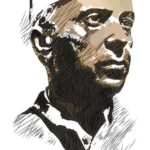Let’s start this essay on Jawaharlal Nehru 👇👇
Introduction:-
Pandit Jawaharlal Nehru was born on November 14, 1889 in Allahabad.His father was a barrister. Mahatma Gandhi and his principles deeply influenced him. He wanted to set India free. He studied law, and under Gandhi’s shadow, he was a part of the freedom movement. When he fought for independence, he was jailed several times. Later, in 1929 he was elected as the President of the Indian National Congress. India was freed from British rule in 1947, and he was the first Prime Minister of free India. After a long service to the nation, he died on May 27, 1964.

Born:- 14 November 1889 Allahabad, North Western Provinces, British India
Died:- 27 May 1964(aged 74) New Delhi, India
Resting place:- Shantivan
Political party:- Indian National Congress
Spouse:- Kamla Kaul
Children:- Indira Gandhi
Parents:- Motilal Nehru (Father) Swarup Rani Nehru (Mother)
Education:- Harrow School Trinity College, Cambridge Inner Temple
Awards:- See awards section
Accomplishments of Jawaharlal Nehru:-
•Served as the President of the Indian National Congress on five occasions.
•Made the historic Declaration of Independence and raised the Tricolor flag in Lahore on New Year’s Even in 1929.
•Oversaw the partition of India while holding the position of Prime Minister.
•Played a crucial role in establishing the Election Commission of India during his tenure as Prime Minister.
•Signed the Indus Water Treaty between Pakistan’s President Ayub Khan and India’s Prime Minister, Jawaharlal Nehru.
Jawaharlal Nehru as Prime Minister:-
Throughout his struggle for independence, Nehru encountered numerous challenges and faced multiple imprisonments.
As a result of his exceptional efforts, India achieved independence on 15th August 1947, leading to his election as the country’s first Prime Minister. From 1929 to 1964, Nehru remained a beloved leader, even after facing challenges like the conflict with China in 1962. He had a secular approach to politics, which differed from Gandhi’s religious and traditional outlook. Although religious freedom was a pressing concern in the country, Nehru’s primary focus was to unify the nation. He successfully led India towards scientific and modern advancements, despite facing various pressures.
Salt March:-1930
Nehru and most of the Congress leaders were ambivalent initially about Gandhi’s plant to begin civil disobedience with a satyagraha aimed at the British salt tax. After the protest had gathered steam, they realised the power the salt as a symbol. Nehru remarkable about the unprecedented popular response, It seemed as though a spring had been suddenly released. He was arrested on 14 April 1930 while on a train from Allahabad to Raipur. Earlier, after addressing a huge meeting and leading a vast procession, he had ceremoniously manufactured some contraband salt. He was charged with breach of the salt law and sentenced to six months of imprisonment at Central jail.
In Prison(1930-1935):-
On 11 October 1930, Nehru’s detention ended, but he was back in jail in less than ten days for resuming the presidency of the banned Congress. On 26 January 1931, Nehru and other prisoners were released early by Lord Irwin, who was negotiating with Gandhi. His father died on 6 February 1931. Nehru was back in jail on 26 December 1931 after violating court orders not to leave Allahabad while leading a no rent campaign to alleviate peasant distress. On 30 August 1933, Nehru was released from prison, but the government soon movee to detain him again. On 22 December 1933, the Home Secretary sent a memo to all local governments in India.
Death:-
Jawaharlal Nehru held the position of India’s Prime Minister from 15th August 1947 until his passing on 27 May 1964, making him the longest serving Prime Minister in Indian history. On 27th May 1964, Jawaharlal Nehru passed away at the age of 74 due to a heart attack.
I hope guy’s you like this essay on Jawaharlal Nehru
